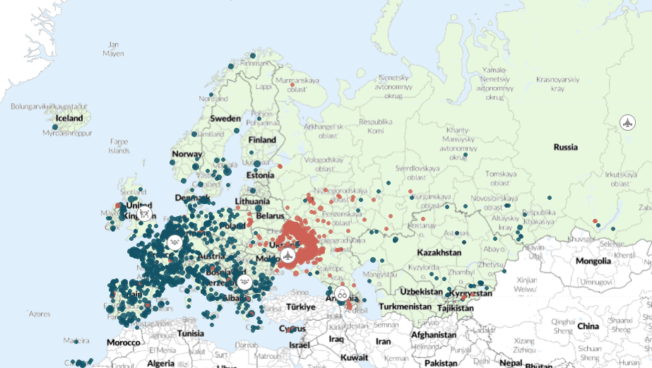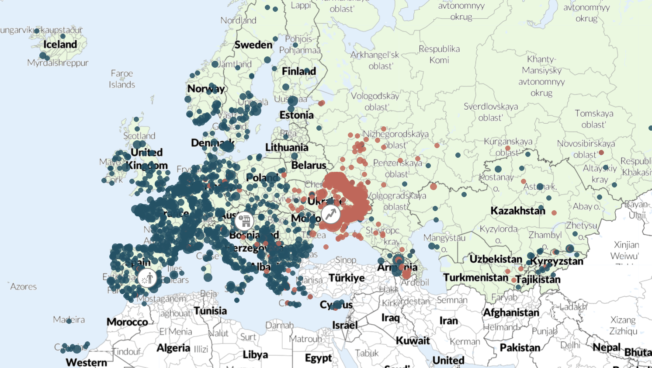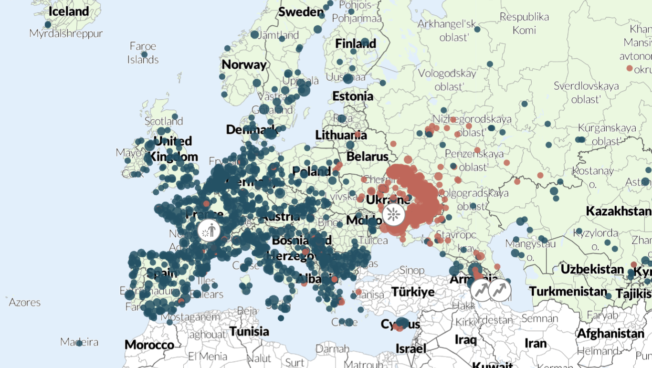Regional Overview
Europe, Caucasus and Central Asia
October 2024
Posted: 7 November 2024
Europe: Conflicts in the Middle East continue to drive demonstrations
The Israeli ground operation in southern Lebanon on 1 October, alongside the anniversary of the 7 October 2023 Hamas attack on Israel, renewed demonstrations in response to the Middle East crisis across Europe. ACLED records at least 400 related gatherings in the region — more than twice the previous three months’ average. While more than 67% of the events in October were critical of Israel, the anniversary of the Hamas attack prompted over 72 protests demanding the release of remaining Israeli hostages, in addition to about 20 pro-Israel vigils held across Europe around 7 October — the highest recorded number since November 2023.
Despite remaining mostly peaceful, some anti-Israel demonstrations turned violent, mainly in Germany and Italy, where demonstrators clashed with police. A group of Israeli tourists clashed with pro-Palestine demonstrators in Rhodes, Greece, on 4 October. In the United Kingdom, Palestine Action activists damaged or defaced several insurance and banking offices across the country as part of a coordinated campaign against investments in the Israeli arms industry. Additionally, pro-Palestine demonstrators briefly disrupted a Dutch Parliament session in the Hague on 21 October, resulting in five demonstrators being arrested by police. Meanwhile, suspected Swedish Foxtrot gangsters opened fire on the Israeli embassy in Stockholm and detonated hand grenades outside the Israeli embassy in Denmark on 1 and 2 October, respectively. Swedish authorities alleged the gang may have acted on orders from Iran.1Alex Maxia, ‘Teenage guns for hire: Swedish gangs targeting Israeli interests,’ BBC, 17 October 2024
Georgia: Allegations of vote-rigging spur protests
On 26 October, Georgia held parliamentary elections that saw the ruling Georgian Dream (GD) party garner about 54% of the vote. Following the electoral commission’s declaration of the results, four opposition groups and President Salome Zourabichvili claimed electoral fraud and demanded a rerun under international oversight.2Gabriel Gavin et al., ‘Uncertainty grips Georgia as opposition street protests end in anticlimax — for now,’ Politico, 28 October 2024 Local and international observers also noted pressure on voters in the run-up to and on election day,3Transparency International Georgia, ‘Evaluation of polling and precinct closing process,’ 27 October 2024; Organization for Security and Co-operation in Europe Office for Democratic Institutions and Human Rights, ‘Georgia’s elections marred by an uneven playing field, pressure and tension, but voters were offered a wide choice: international observers,’ 27 October 2024 while some pollsters and analysts suggested manipulation of the outcome, especially in rural areas.4Paul Kirby, ‘Georgian vote result makes no statistical sense – Western pollsters,’ BBC, 1 November 2024; Luka Pertaia, Ivan Gutterman, and Wojtek Grojec, ‘The Russian Tail: How Data Could Reveal Georgian Election Fraud,’ Radio Free Europe / Radio Liberty, 1 November 2024 The electoral campaign was markedly calm, though mass brawls between GD and United National Movement (UNM) supporters occurred on election day in two districts of the capital Tbilisi. Additionally, about 150 unidentified perpetrators vandalized the UNM office in Tbilisi and attacked people inside. The office of another opposition group, Coalition for Change, was also vandalized in the western town of Zugdidi.
The results of the election also triggered opposition demonstrations, though the scale of protests immediately following the election outcome remained moderate, especially in comparison with the unrest in response to the passage of the foreign agent law in May and pro-European and pro-GD rallies in the run-up to the vote.5Euronews, ‘Thousands of Georgians join pro-EU march in Tbilisi ahead of next week’s elections,’ 20 October 2024; Radio Free Europe / Radio Liberty, ‘Georgians Rally In Tbilisi Ahead Of Crucial Vote,’ 23 October 2024 Yet, with legal challenges to the election results mostly thrown out of courts and the electoral commission standing by its tally, the risk of violence could be increasing. Following contested parliamentary elections in 2020, the ruling party and the opposition overcame a similar political crisis thanks to European Union mediation.6European Council, ‘The political crisis is over, says President Michel in Georgia,’ 20 April 2021 EU-Georgia relations have deteriorated since then, and Georgia’s accession talks are effectively halted due to democratic backsliding.7Delegation of the European Union to Georgia, ‘Statement by the EU Ambassador Pawel Herczynski at the Press Conference, following the publication of the 2024 EU Enlargement Report on Georgia,’ 30 October 2024
See also ACLED Election Watch report, Georgia: An “existential” election.
Portugal: Police killing of a Black man prompts riots
In the early hours of 21 October, police fatally shot a Cape Verde-born man, Odair Moniz, in the Cova da Moura neighborhood of Amadora, Lisbon. In the following week, the killing prompted demonstrations in the capital and the second-largest city of Porto. Police claim that Moniz was armed and resisted arrest, while activists and community groups argue the incident reflects a broader pattern of police violence, particularly toward marginalized communities.8SOS Racismo, ‘Comunicado – Odair Moniz, mais um na longa lista de mortos às mãos da PSP,’ 22 October 2024 An investigation into the shooting is underway. On 22 October, riots broke out in Amadora and quickly spread to at least seven other municipalities in the Lisbon metropolitan area, including Sintra, Oeiras, and Almada, and continued until 29 October. ACLED records at least 21 violent demonstrations that week — more than at any point since ACLED’s coverage of Portugal began in 2020. Participants vandalized properties and torched vehicles and street furniture, and police made more than 21 arrests.9Público, ‘Mais de 120 ocorrências e 21 detidos em desacatos após morte de Odair Moniz,’ 25 October 2024 On 26 October, thousands of people took to the streets against racism and police violence in Lisbon. On the same day, the ascendant far-right anti-immigration Chega (Enough) political party staged a separate rally in support of police. In recent years, demonstrations against police violence erupted in other European countries, such as France in June 2023 and Greece in December 2022.
Correction: A previous version of this Regional Overview characterized Sintra, Oeiras, and Almada as distinct metropolitan areas. They are part of the Lisbon metropolitan area.
Russia: North Korean forces join the fight
Russian forces undertook yet another multi-pronged offensive in the Ukrainian-occupied Kursk region around 10 October. Despite further reducing the Ukrainian foothold in the region, Russian forces did not advance to the town of Sudzha and the nearby international border. In parallel, Russian forces ramped up combined air and artillery strikes on Ukrainian positions in Kursk region, nearly doubling their number.
The reported arrival of an estimated 10,000 North Korean soldiers to Kursk region prompted concerns about an escalation of Russia’s war against Ukraine.10NATO, ‘Doorstep statement by NATO Secretary General Mark Rutte following the North Atlantic Council briefing on the DPRK’s troop deployment to Russia,’ 28 October 2024 Up until now, North Korea’s involvement had been limited to patching up Russia’s shortage of artillery shells and missiles.11George Grylls, ‘North Korea ‘supplies half of the shells used by Russia in Ukraine,’ Times, 4 October 2024 In June, Russia’s President Vladimir Putin and North Korea’s leader Kim Jong Un signed a bilateral security pact, which Russia’s State Duma rushed to ratify in October as reports of North Korean deployments to Russia proliferated.12Associated Press, ‘Russian lawmakers ratify pact with North Korea as US confirms that Pyongyang sent troops to Russia,’ 24 October 2024 It is unclear whether North Korean troops are to be used in combat roles on Russian territory only or if they will join Russia’s aggression against Ukraine as well. The Russian army has been blighted by a shortage of contracted personnel that federal authorities have been attempting to mitigate with increasing sign-up bonuses for new recruits.13Reuters, ‘Putin doubles signing bonuses for volunteers to fight in Ukraine,’ 31 July 2024; The Bell, ‘Russia boosts army sign-up bonuses amid escalating frontline losses,’ 16 October 2024
Ukraine: Battle for the Donetsk region intensifies
The fighting in Ukraine notched another all-time high. In October, ACLED records almost 1,800 battle events in the country, up about 10% from the previous peak in September since Russia’s all-out invasion in February 2022. Nearly two-thirds of the battles occurred in the Donetsk region, where Russian forces seized the relatively big town of Selydove. It had a pre-war population of over 20,00014Guy Faulconbridge, ‘Russia takes two Ukrainian towns as it advances at fastest pace in a year,’ Reuters, 29 October 2024 and is located halfway between Ukrainian forces’ logistical nodes in Pokrovsk and Kurakhove. Russian forces also seized 30 other settlements in the area. Fighting also picked up in the Kharkiv, Zaporizhia, and Kherson regions. Russia’s push in terms of captured settlements approached a pace last seen at the height of its offensive in June and July 2022, which resulted in Ukraine’s loss of almost the entire Luhansk region. In the northern part of the Donetsk region, Russian forces continued stalling in Toretsk and Chasiv Yar, despite advancing in the former and crossing the Siverskyi Donets – Donbas Canal in the latter.
For more information, see the ACLED Ukraine Conflict Monitor
See More
See the Codebook and the User Guide for an overview of ACLED’s core methodology. For additional documentation, check the Knowledge Base. Region-specific methodology briefs can be accessed below.
Links:
For additional resources and in-depth updates on the conflict in Ukraine, check our dedicated Ukraine Confict Monitor.







